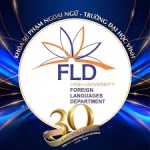Speaker
Description
Blended learning (i.e., integrated in-person and online learning) has been implemented in the field of language teaching and learning worldwide. In recent years, blended English language courses have also become popular at many higher education institutions in Vietnam. As blended learning is still a rather novel instructional approach in the Vietnamese context, this study, therefore, aimed to investigate how Vietnamese teachers perceive its benefits as well as the challenges that they may encounter when teaching blended English classes at tertiary level. Thirteen English teachers at a public university in Vietnam participated in the study. All participants taught English courses which combined in-person and online teaching to undergraduate students of non-English majors. They completed a questionnaire in which they had to rate, on a five-point Likert scale, their perceived value of blended learning and participated in an individual semi-structured interview. The results showed that the majority of the participants perceived blended learning as helpful in improving their students’ language skills, particularly, their reading skills and vocabulary knowledge. Their interview data showed that they encountered a number of challenges such as increased workload and inadequate technical and pedagogical training in preparing and teaching blended courses. The results suggest that blended learning may be beneficial to the development of tertiary level students’ English skills, and teachers should receive proper training and technical support in the design and implementation of blended English courses.

